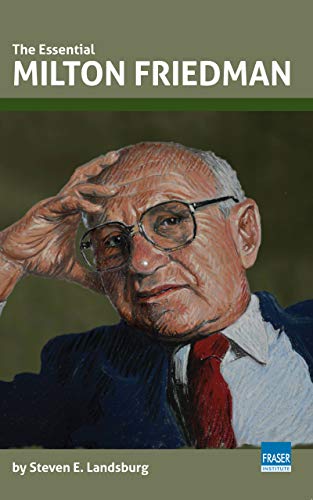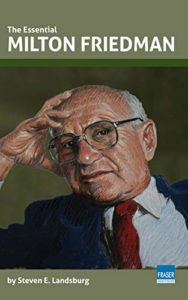

I enjoyed reading Steven Landsburg’s The Essential Milton Friedman, which was recently published by the Fraser Institute. It’s a short quick exposition of Friedman’s work and views by a master expositor.
My biggest surprise was the section of his last chapter in which Steve quotes at length Leo Rosten’s description of Milton. I hadn’t known until I read Milton and Rose Friedman’s autobiography, Two Lucky People, that they became lifelong friends with Rosten after meeting him in graduate school at the University of Chicago in the mid-1930s. (Personal story: I found Rosten’s famous book, The Joys of Yiddish, in my home library this morning; it was given to me by my wife-to-be, then Rena Epstein, on my 31st birthday, one month after we had met, and she dedicated it to “my favorite shaygets.”)
I hasten to add that I’m surprised, not because I think Rosten’s description doesn’t fit, but because it fits Milton exquisitely and I hadn’t known of it.
I’ll quote Steve without block quotes and then his quote from Rosten in block quotes.
For some, no degree of civility or fairness could compensate for Friedman’s infuriating refusal to accept their poorly supported prejudices. The storyteller Leo Rosten, in his book on People I Have Loved, Known or Admired, changed Friedman’s name to Fenwick but otherwise painted a portrait that was instantly recognizable to all who knew him:
He is an exceedingly lovable little man. His disposition is so sunny, his character so open, that even the Most Hardened Cynics, of whom my wife is International Chairman, call Fenwick “utterly adorable.”
Yet, says Rosten, many people can’t stand him:
Fenwick is a man who goes around being logical. He even uses reason at cocktail parties… The basic problem is that Fenwick, who is very intelligent, assumes that other people are very intelligent too. And that, believe it or not, is the way he talks to them. This makes people uneasy, for nothing is more unsettling than to be treated as if you are extremely intelligent—especially by someone you hardly know. To avoid disillusioning such a man requires that you maintain a constant state of alert, and think before you speak… It even makes you examine the partly packaged platitudes you have always employed instead of thinking.
In ordinary conversation, Fenwick is a fellow-traveler. He follows every chug in your train of thought—indeed, he leaps right on the train with you. And you have barely begun to pick up steam before Fenwick excitedly demonstrates that (a) you have taken the wrong train; or (b) it doesn’t stop where you want to go; or (c) the tracks don’t lead from your premise to your expectations; or (d) you had better jump off while the jumping’s good or you’ll land in the swamp of mushy ideas you never suspected your position rests upon.
Oscar Wilde … once quipped: “I can stand brute force, but brute reason is quite unbearable… It is hitting below the intellect.” Fenwick, a beamish fellow, never hits below the intellect. He is always kind, fair, patient, moderate—which greatly increases his unpopularity. Do you follow me? Fenwick is so fair in discussions that people can’t even accuse him of using unfair tactics, than which nothing is more aggravating when you are wrong.
It is a truth universally acknowledged among those who knew Milton Friedman personally that Rosten’s portrait of the kind, fair, patient, moderate, and infuriatingly logical Fenwick is close to a perfect likeness. The maintenance of that fair and even disposition even in the face of extreme hostility is an accomplishment as rare and as praiseworthy as the permanent income hypothesis or the quantity theory of money.
End of segment from Landsburg. I love the line from Oscar Wilde.
I agree with Steve. It’s “close to a perfect likeness.” I did have one negative experience with Milton where he wasn’t like the description above and it surprised me. But I bounced back and so, apparently, did Milton; within two hours he, Rose, and I were enjoying each other’s company at the opening dinner of what turned out to be the first annual Austrian Economics Conference in South Royalton, Vermont. I would quote what happened but most close friends of mine already know the story and repeating it might sound as if I bear a grudge. I really don’t.

READER COMMENTS
Scott Sumner
Jan 13 2020 at 11:20pm
Very nice. But should the paragraph that begins “For some” be in block quotes?
David Henderson
Jan 14 2020 at 12:08am
Yes. Thanks, Scott. Correction made.
Brandon Berg
Jan 14 2020 at 3:39am
Not related to this post in particular, but recently, the post author is no longer showing up in the RSS feed. I’m not sure whether this is intentional.
David Henderson
Jan 14 2020 at 8:20am
Thanks, Brandon. I noticed that too.
Michael
Jan 14 2020 at 8:02pm
Milton Friedman changed my world view.
He was a great public speaker and debater.
You did not want to debate him unless you are fine with losing.
He was extremely logical and an optimist but not utopian.
One of a kind.
I think the smartest most logical economist and intellectual I have ever read.
His son David is also extremely smart.
Robert Lloyd Hetzel
Jan 17 2020 at 10:23am
I once asked Milton why he never lost his temper but just smiled when attacked. He told me that in 1937 when he was in Washington doing budget studies he lost his temper in a meeting. He said that he realized it did not do any good so he decided never to lose his temper. So rational, so like Milton. Milton lived for ideas. I could never persuade him to comment on a critic’s motives or personality. I asked his wonderful, lifelong secretary Gloria Valentine if she had ever seen Milton angry. She said no with one exception when a University of Wisconsin professor accused him of constructing the money series he and Anna used in a way designed in advance to fit the data (nominal GDP). We so much need Milton now when debate has polarized with groups dividing based on the presumed moral superiority of one’s group views. Friedman said that if groups disagree over values, all they can do ultimately is fight. He advocated agreeing on common goals and then using rational discourse to find solutions. For Friedman, economics was a universal language spoken by all who believed that reason could make the world a better place. The great political economist at the University of Chicago, Hans Morgenthau, accused Friedman of fighting the intellectual wars of the 19th century. Friedman loved it.
Comments are closed.